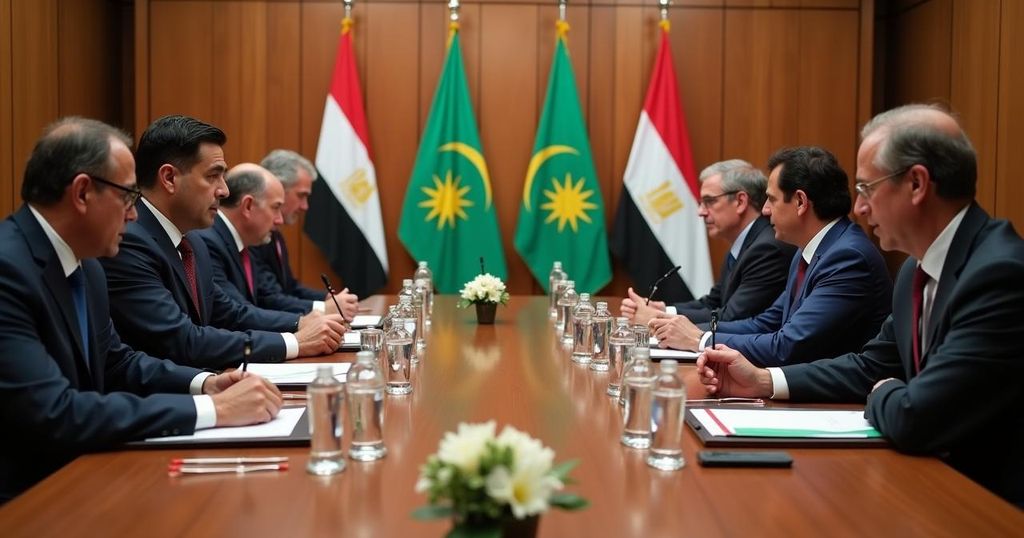The leaders of Egypt, Somalia, and Eritrea convened in Asmara to discuss cooperation amid rising tensions with Ethiopia, which is seeking greater access to ports. The summit, interpreted by some as a move against Ethiopia, highlighted growing alliances in the region but was downplayed by Somali officials as merely cooperative in nature. The evolving geopolitical landscape remains tense, influenced by Ethiopia’s internal issues and territorial ambitions, suggesting potential for future conflict.
The recent summit held in Asmara, Eritrea, brought together the leaders of Egypt, Somalia, and Eritrea, three nations that maintain strained relationships with Ethiopia. A concluding statement from the Eritrean government emphasized the importance of “respect for the sovereignty… and territorial integrity of the countries in the region,” which many interpret as a veiled reference to Ethiopia’s aspirations for direct sea access. Somalia’s new alignment with Egypt and Eritrea appears to have stemmed from recent diplomatic tensions, raising concerns about potential conflict in the region. Hassan Khannenje, director of the Horn International Institute for Strategic Studies, characterized this gathering as an “axis against [Ethiopian capital] Addis Ababa,” suggesting that it is an initiative aimed at uniting these nations in opposition to Ethiopia’s influence. However, Somalia’s Information Minister, Daud Aweis, contested this narrative, asserting that the summit was focused solely on enhancing cooperation among the three countries and not intended to provoke Addis Ababa. A photograph publicized post-summit illustrated Eritrean President Isaias Afwerki alongside Egyptian President Abdul Fattah al-Sisi and Somali President Hassan Sheikh Mohamud, reflecting the solidarity among the leaders. They reportedly reached an agreement to bolster Somali state institutions to address internal and external challenges, as well as enable the Somali National Federal Army to tackle terrorism. Although this meeting marked President Sisi’s first visit to Asmara, President Mohamud has made three trips this year alone. Ethiopia has traditionally supported the Somali government in combating the al-Qaeda-affiliated militant group al-Shabab. Nevertheless, Somalia has expressed strong discontent over Ethiopia’s recent preliminary agreement with the self-declared Republic of Somaliland regarding the lease of part of its coastline, a territory Somalia claims as its own. The relations between Ethiopia and Egypt have also been strained for years, primarily due to disputes surrounding Ethiopia’s construction of a substantial hydroelectric dam on the Nile River, with Egypt viewing this project as a potential threat to its water supplies. Complicating the dynamics further, Egypt’s recent military support to Somalia, including the delivery of arms and ammunition, signals a deeper alliance that may be forming in opposition to Ethiopia. The current political climate in the Horn of Africa reflects deteriorating relations, especially after the civil war in Ethiopia’s northern Tigray region, which has rekindled historical tensions with Eritrea, a former adversary now viewed as an ally. This summit, therefore, underscores the shifting alliances and the geopolitical complexities surrounding the Ethiopian crisis, reaffirming the imperative of regional stability in a landscape marked by historical rivalries.
The geopolitical environment of the Horn of Africa is characterized by intricate relationships among neighboring countries. Ethiopia, once embroiled in conflict with Eritrea, experienced a thawing of relations following a peace agreement initiated in 2018. However, recent events, particularly Ethiopia’s internal conflicts and territorial ambitions, have reignited tensions with its neighbors, notably Egypt and Somalia, creating an urgent need for diplomatic engagement. The longstanding disagreements include territorial claims and resource management, particularly concerning water access from the Nile River, escalating the regional conflict potential. This diplomatic gathering represents a significant pivot in regional collaboration against perceived Ethiopian aggression.
The summit in Eritrea represents a critical moment in the emerging alliances within East Africa, as Egypt, Somalia, and Eritrea consolidate their positions in response to Ethiopia’s regional policies. Despite conflicting narratives regarding the intent of this gathering, it is clear that the tensions between these nations are poised to influence the political landscape significantly. Continued diplomatic efforts will be essential in preventing potential conflicts and fostering stability in an already volatile region.
Original Source: www.capitalfm.co.ke






